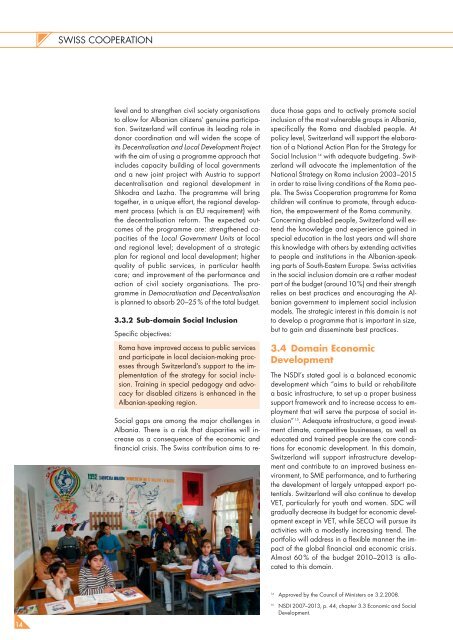Coorperation Strategy - Albania 2010-2013 - Deza - CH
Coorperation Strategy - Albania 2010-2013 - Deza - CH
Coorperation Strategy - Albania 2010-2013 - Deza - CH
Create successful ePaper yourself
Turn your PDF publications into a flip-book with our unique Google optimized e-Paper software.
SWISS COOPERATION<br />
level and to strengthen civil society organisations<br />
to allow for <strong>Albania</strong>n citizens’ genuine participation.<br />
Switzerland will continue its leading role in<br />
donor coordination and will widen the scope of<br />
its Decentralisation and Local Development Project<br />
with the aim of using a programme approach that<br />
includes capacity building of local governments<br />
and a new joint project with Austria to support<br />
decentralisation and regional development in<br />
Shkodra and Lezha. The programme will bring<br />
together, in a unique effort, the regional development<br />
process (which is an EU requirement) with<br />
the decentralisation reform. The expected outcomes<br />
of the programme are: strengthened capacities<br />
of the Local Government Units at local<br />
and regional level; development of a strategic<br />
plan for regional and local development; higher<br />
quality of public services, in particular health<br />
care; and improvement of the performance and<br />
action of civil society organisations. The programme<br />
in Democratisation and Decentralisation<br />
is planned to absorb 20–25 % of the total budget.<br />
3.3.2 Sub-domain Social Inclusion<br />
Specific objectives:<br />
Roma have improved access to public services<br />
and participate in local decision-making processes<br />
through Switzerland’s support to the implementation<br />
of the strategy for social inclusion.<br />
Training in special pedagogy and advocacy<br />
for disabled citizens is enhanced in the<br />
<strong>Albania</strong>n-speaking region.<br />
Social gaps are among the major challenges in<br />
<strong>Albania</strong>. There is a risk that disparities will increase<br />
as a consequence of the economic and<br />
financial crisis. The Swiss contribution aims to re-<br />
duce those gaps and to actively promote social<br />
inclusion of the most vulnerable groups in <strong>Albania</strong>,<br />
specifically the Roma and disabled people. At<br />
policy level, Switzerland will support the elaboration<br />
of a National Action Plan for the <strong>Strategy</strong> for<br />
Social Inclusion 14 with adequate budgeting. Switzerland<br />
will advocate the implementation of the<br />
National <strong>Strategy</strong> on Roma inclusion 2003–2015<br />
in order to raise living conditions of the Roma people.<br />
The Swiss Cooperation programme for Roma<br />
children will continue to promote, through education,<br />
the empowerment of the Roma community.<br />
Concerning disabled people, Switzerland will extend<br />
the knowledge and experience gained in<br />
special education in the last years and will share<br />
this knowledge with others by extending activities<br />
to people and institutions in the <strong>Albania</strong>n-speaking<br />
parts of South-Eastern Europe. Swiss activities<br />
in the social inclusion domain are a rather modest<br />
part of the budget (around 10 %) and their strength<br />
relies on best practices and encouraging the <strong>Albania</strong>n<br />
government to implement social inclusion<br />
models. The strategic interest in this domain is not<br />
to develop a programme that is important in size,<br />
but to gain and disseminate best practices.<br />
3.4 Domain Economic<br />
Development<br />
The NSDI’s stated goal is a balanced economic<br />
development which “aims to build or rehabilitate<br />
a basic infrastructure, to set up a proper business<br />
support framework and to increase access to employment<br />
that will serve the purpose of social inclusion”<br />
15 . Adequate infrastructure, a good investment<br />
climate, competitive businesses, as well as<br />
educated and trained people are the core conditions<br />
for economic development. In this domain,<br />
Switzerland will support infrastructure development<br />
and contribute to an improved business environment,<br />
to SME performance, and to furthering<br />
the development of largely untapped export potentials.<br />
Switzerland will also continue to develop<br />
VET, particularly for youth and women. SDC will<br />
gradually decrease its budget for economic development<br />
except in VET, while SECO will pursue its<br />
activities with a modestly increasing trend. The<br />
portfolio will address in a flexible manner the impact<br />
of the global financial and economic crisis.<br />
Almost 60 % of the budget <strong>2010</strong>–<strong>2013</strong> is allocated<br />
to this domain.<br />
14<br />
Approved by the Council of Ministers on 3.2.2008.<br />
14<br />
15<br />
NSDI 2007–<strong>2013</strong>, p. 44, chapter 3.3 Economic and Social<br />
Development.

















